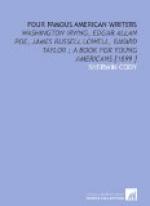But an account of his friendships would not be complete without a reference to Mr. Bufleb, whom he met on his journey up the Nile. Taylor writes to his mother from Nubia: “I want to speak of the friend from whom I have just parted, because I am very much moved by his kindness, and the knowledge may be grateful to you. His friendship for me is something wonderful, and it seems like a special Providence that in Egypt, where I anticipated the want of all near sympathy and kindness, I should find it in such abundant measure. He is a man of totally different experience from myself: accustomed all his life to wealth, to luxury, and to the exercise of authority. He was even prejudiced against America and the Americans, and he confessed to me that he was by nature stubborn and selfish. Yet few persons have ever placed such unbounded confidence in me, or treated me with such devotion and generosity.... For two days before our parting he could scarcely eat or sleep, and when the time drew near he was so pale and agitated that I almost feared to leave him. I have rarely been so moved as when I saw a strong, proud man exhibit such an attachment for me.... I told him all my history, and showed him the portrait I have with me [that of Mary Agnew]. He went out of the cabin after looking at it, and when he returned I saw that he had been weeping.”
Surely, there must have been something peculiarly noble and sweet in Bayard Taylor’s nature to have drawn to him so powerfully a man of another nation and another race. The friendship was lasting, and Taylor spent many happy weeks at Mr. Bufleb’s home in Gotha, Germany. The latter even bought a little house and garden adjoining his own estate, which was for the special use of his friend, and he closes the letter which describes it by saying: “You see how I have written to you, my dear Taylor. In spite of our long separation and remoteness from each other, your heart I know could never tell you of any change in my feelings and thoughts. On the contrary, this rapport which we enjoy has for me a profound meaning; whilst you were dedicating your glorious work on Central Africa to me, I was setting in order for you the most cherished part of my possessions.”
CHAPTER XIII
LAST YEARS
With the building of Cedarcroft, and the publication of his “Poet’s Journal,” Bayard Taylor’s fame and fortune reached their height. The Civil War was now on the point of breaking out. He entered into the Northern cause with ardor, and even sold a share of Tribune stock to raise a thousand dollars with which to fit out his brother Frederick and provide arms for his neighbors to defend their homes.
But the war put an end to his lectures, and cut off other sources of his income. In 1862 he was appointed secretary of legation at the court of St. Petersburg, and not long after was left there as charge d’affaires. The cause of the Union had received some heavy reverses, and France had invited England and Russia to join her in intervening between the combatants. But, perhaps owing to Bayard Taylor’s diplomatic skill, Russia refused to take part in such an enterprise without the express desire of the United States.




